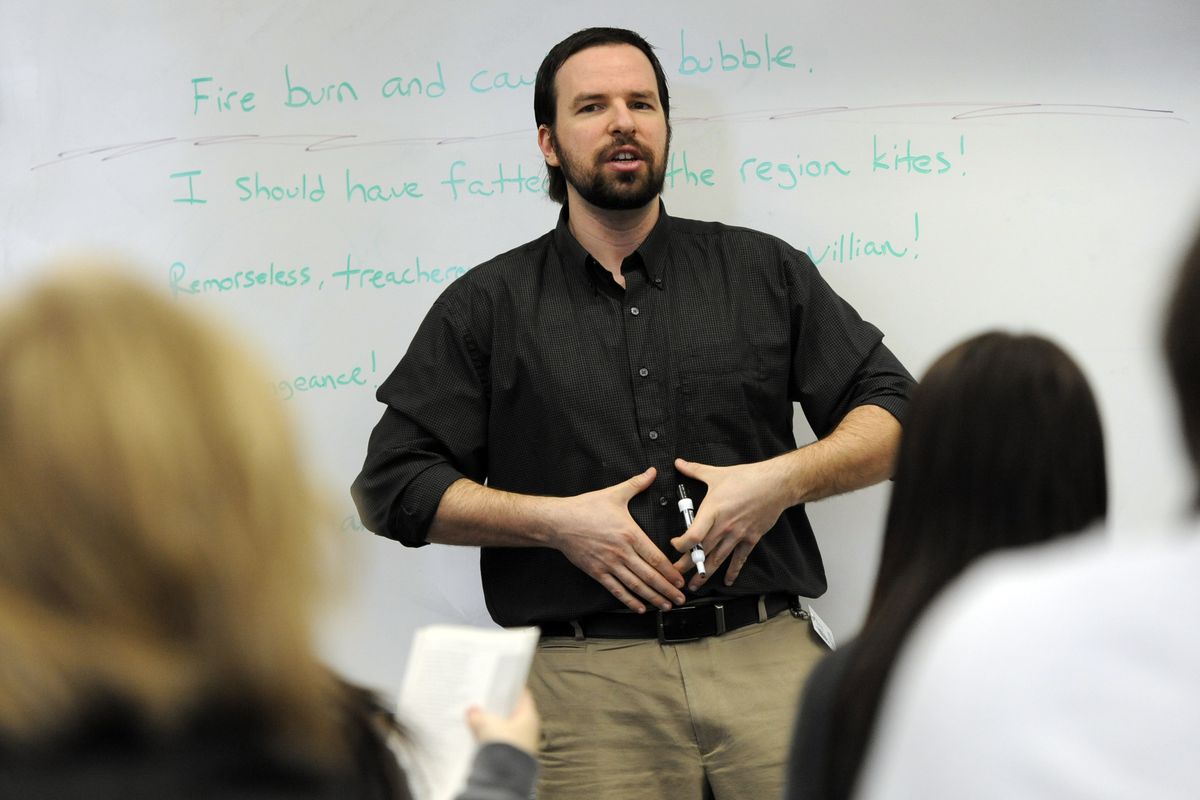Theater pro makes Shakespeare more accessible to students
Professional actor Chris Taylor tries to explain the term “loins” from “Romeo and Juliet” to a senior English class Friday at Rogers High School. (Jesse Tinsley)Buy a print of this photo
The idea behind the Spokane Civic Theatre’s new Shakespeare in Schools Program is to introduce students to the Bard of Avon with less eye-rolling and more dynamism than the usual reading of the plays.
“Actually, the first thing I ask the students is if they feel like rolling their eyes with boredom,” said Chris Taylor, Civic’s director of education, who is teaching the Shakespeare program. “Many students say ‘yes’.”
Taylor is a Shakespearian actor; the sheer enjoyment he gets from talking about William Shakespeare is bound to rub off on his students.
On Friday, Taylor was working with Kelly Guilfoil’s English class at Rogers High School.
The day before, students had climbed onstage, donned costumes and acted out parts from “Hamlet.”
Now it was time to translate lines from “Romeo and Juliet.”
“Actually, we don’t translate, we paraphrase,” Taylor said.
Students worked through this part:
From forth the fatal loins of these two foes
A pair of star-crossed lovers take their life;
Whose misadventured piteous overthrows
Doth with their death bury their parents’ strife.
For a generation that’s getting used to communicating in 140-character statements on Twitter, that’s quite a mouthful.
So Taylor walked the class through the lines, word by word, asking the class to suggest different words and phrases.
“Fatal loins” turned into exploding gut, or fatal wound. “Strife” became feud or conflict, and so on.
Taylor then moved on to explain iambic pentameter – a specific rhythm Shakespeare used in writing his sonnets and plays.
He got the students to stand up and stamp the rhythm with one foot.
“If I said Shakespeare was the greatest rap artist of his time, what would you say?” asked Taylor.
Some in the class nodded as Taylor went on to explain that one reason iambic pentameter was so popular was that it helped actors remember their lines.
Students were a little shy when Taylor asked for volunteers to read aloud, but he only had to call on a few.
“I think it’s a fun way to do Shakespeare, and it’s much more interactive than what we usually do,” said senior Hailey Christy, 18.
Senior Robbie Milliken, 17, agreed. “It’s like I understand it more. I like how he gets us into it.”
Christy said she got a kick out of playing one of the “Hamlet” characters.
Milliken was part of the short play, too, but has no dreams of becoming an actor.
“I’d like to be paid like an actor, but I wouldn’t want to act for a living,” he said, laughing.
The Shakespeare in Schools Program is for middle and high school students, and each class gets to pick its own interactive plot summary from the plays “Hamlet,” “Romeo and Juliet” and “Macbeth.”
Taylor, who’s in the Civic’s current production of “The Count of Monte Cristo,” said he really enjoys teaching the classes.
“We always talk about how come Shakespeare is still current, how come he still speaks to us” hundreds of years later, Taylor said. “Inside Shakespeare’s plays are love and hate and war. He elevates everything to the extreme, and we can act to explore our emotions within the safety of the fiction. I think that’s why he still speaks to us.”
Taylor said that paraphrasing a monologue is a great way to get started.
“The code is the weird language. Once you crack the code, you can get in there and better understand what’s going on,” Taylor said.
The program is offered free to schools, and Taylor said classes and teachers he’s worked with have responded well.
Milliken and Christy both liked the program.
“I wish he’d come back and teach another class,” Christy said.

